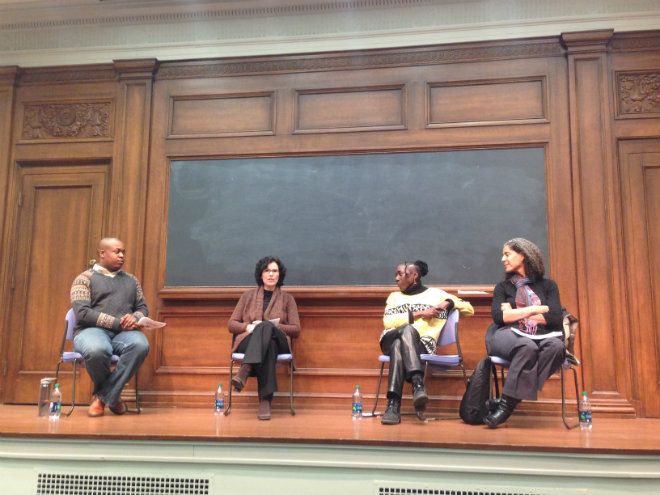
On Monday evening, Unshackle NU hosted a panel of speakers to discuss mass incarceration and its social effects, including police brutality, the War on Drugs and the ways these issues are tied to disenfranchisement.
“The overarching idea of wanting to talk about the different ways in which the prison industrial complex effects black and brown communities is what drove this conversation,” said Matthew Wright, a Medill senior who moderated the panel. “We are always talking about different ways in which we can engage with the public and engage with the issues that black and brown people face in the system and really hold Northwestern accountable.”
The event, which drew over 50 student attendees, featured three speakers: Mary Pattillo, a professor of sociology and African American studies at Northwestern; Martha Biondi, a professor of African American studies and history; and Deborah Small, the founder of Break the Chains, an advocacy organization that focuses on the impact of the War on Drugs on communities of color. Small was formerly the director of public policy and community outreach for the Drug Policy Alliance.
Each of the speakers gave brief commentaries on their specific areas of expertise, and then Wright, the moderator, asked the panelists questions. Biondi spoke primarily about the difference between small, everyday acts of police brutality (for example,“stop and frisk,” and the criminalization of poverty) and spectacularly violent police brutality (think Ferguson and Michael Brown, viral videos of police brutality and police militarization). “We are the citizens, we are the taxpayers, the police work for us,” Biondi noted.
Small went on to present an argument against the War on Drugs, starting with a history lesson. “This is an empire that has built itself on the commercialization of addiction...and on of the byproducts is we instilled an addiction to punishment,” Small said.
While society has begun to recognize that the War on Drugs did more harm than good and that addiction is a disease, in order to help people face addiction we must stop criminalizing it, she said.
“It is not enough to acknowledge that we have done wrong and do nothing to repair the damage that you caused. For me the charge that I want to leave you all with is: What are the reparations?” Small said.
Following Small’s call to action, Pattillo gave some background on the social effects of mass incarceration, laying out examples of collateral consequences. Those who are incarcerated, along with their families, face the challenges of lost income, debt, lost privileges for public housing and the inability to vote, or disenfranchisement. “This mass incarceration and the racism that exists within it affects all of our racial attitudes… it is a societal consequence,” Pattillo said.
The panel was then open to questions from the audience. Some of the questions students asked included why police officers are often not indicted on charges of police brutality, and why black women are largely left out of the conversation around mass incarceration.
Students in the audience were receptive to the speakers, snapping and cheering in agreement even at the heavy nature of the topics discussed. “I think what they are doing is very important,” said SESP junior Godwin Igwebuike. “Definitely now things are more out in the open but these are problems being faced by repressed people, specifically African Americans, for a long time now. I think the more we know the more we talk about it and the more we come together and think about ways to improve.”